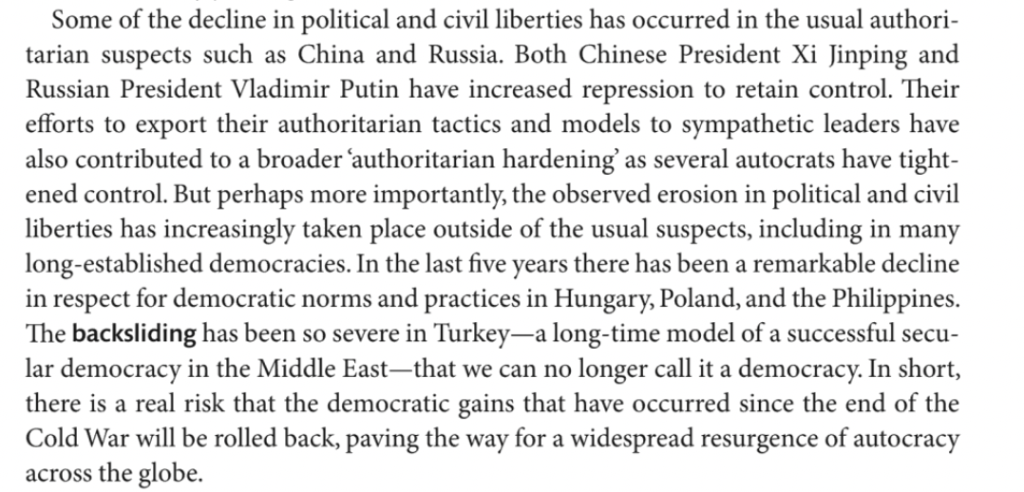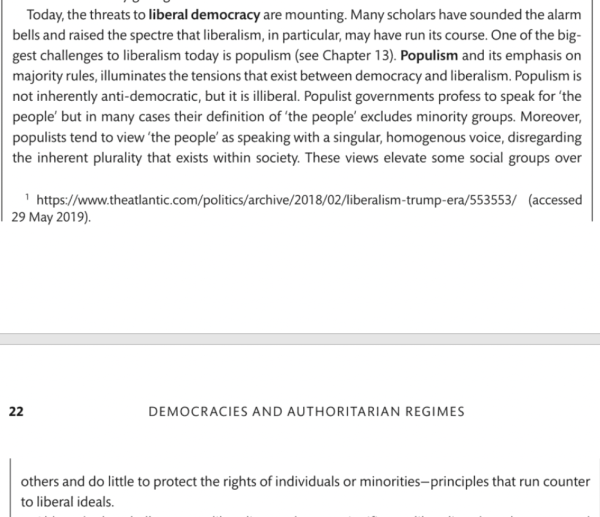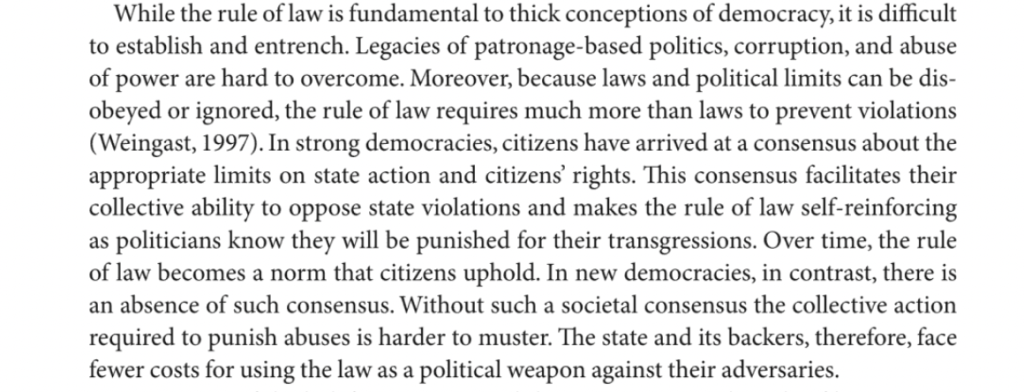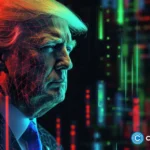I was recently looking for a bad book to read – preferably in the disconnected-from-reality US foreign policy section while waiting for Anne Applebaum’s forthcoming Autocracy, Inc.: The Dictators Who Want to Run the World. During my perusing I came across the fact that Andrea Kendall-Taylor, a former CIA analyst, anti-Putin fanatic and supporting actor in the first impeachment of President Trump, co-authors collegiate textbooks, including the 2020 Democracies and Authoritarian Regimes. The text is described as a “broad, accessible overview of the key institutions and political dynamics in democracies and dictatorships, enabling students to assess the benefits and risks associated with democracy, and the growing challenges to it.” Sold.
Kendall-Taylor’s writing team often consists of Erica Frantz, an associate professor of political science at Michigan State University, and Joseph Wright, professor of political science at Penn State. Their disclosure statements on a recent article reveal that Frantz receives funding from USAID, the Pierre Omidyar-funded Luminate Foundation, and the Charles Koch Foundation. Wright receives funding from the Luminate Foundation, Charles Koch Foundation, and the Department of Defense’s Minerva Research Initiative. Doubly sold.

Kendall-Taylor also co-authored the 2015 textbook Development and the State in the 21st Century: Tackling the Challenges facing the Developing World and the forthcoming book, The Origins of Elected Strongmen: How Personalist Parties Destroy Democracy from Within.
Spooks already move into roles (that we know about) as news pundits, politicians, and think tank staff. Maybe some readers from academia can comment on how common it is that they become professors and write textbooks in addition to their memoirs:
A Democracy Expert Who Despises Democracy
Andrea Kendall-Taylor is currently a senior fellow and director of the Transatlantic Security Program at the Center for a New American Security (CNAS), a bipartisan (think Hillary Clinton and John Bolton) neocon-liberal think tank from which Vice President Kamala Harris drew heavily from to fill the ranks of her foreign policy advisors. Here’s more of Kendall-Taylor’s bio:
Prior to joining CNAS, Kendall-Taylor served for eight years as a senior intelligence officer. From 2015 to 2018, she was deputy national intelligence officer for Russia and Eurasia at the National Intelligence Council (NIC) in the Office of the Director of National Intelligence (DNI). In this role, Kendall-Taylor led the U.S. intelligence community’s (IC) strategic analysis on Russia, represented the IC in interagency policy meetings, provided analysis to the National Security Council, and briefed the DNI and other senior staff for White House and international meetings. Prior to joining the NIC, Kendall-Taylor was a senior analyst at the Central Intelligence Agency where she worked on Russia and Eurasia, the political dynamics of autocracies, and democratic decline.
Outside CNAS, Kendall-Taylor has been a CNN national security analyst. She is also a Distinguished Practitioner in Grand Strategy at Yale University’s Jackson School of Global Affairs and an adjunct professor at Georgetown University’s School of Foreign Service.
Kendall-Taylor is one of many mainstream Russian “experts” in the US who describe Putin as a corrupt dictator presiding over a failed country. She’s a prototypical Blob creature working to organize the world the way they see fit, which typically ends up killing a lot of people but benefits American capital.
Kendall-Taylor also embodies the existential crisis facing many Blob creatures after the election of Trump, which has only been compounded by their inability to inflict defeat on Putin and Russia.
In response, she has taken refuge in the citadel of quack scholarship on democracy and “personalist parties.” Unsurprisingly, fear of the people pervades much of the work that Kendall-Taylor co-writes. A recent piece on why Trump is a danger to democracy includes all the usual history-started-in-2016 complaints that lack any self-reflection on the part of people like Kendall-Taylor. When you completely ignore all the elite decisions in recent decades that have been a disaster for a majority of the population, it’s easier to make her argument that those very same elite should continue to have a monopoly on decisions, and that is the primary complaint – that Trump has disrupted that to a small degree:
Traditional parties, including the pre-Trump Republican Party, offer voters a bundle of policy positions hashed out among multiple elite factions of the party.
The implication is obviously that voters should be happy with whatever crumbs are thrown their way after elites get done hashing things out.
It is unsurprising that individuals like Kendall-Taylor would feel this way about the people; after all if the people were given more say and real choices, they might decide that individuals like Kendall-Taylor should be stripped of all their titles and influence. It’s no surprise then that she was colleague and mentor to the CIA whistleblower that helped lead to the first impeachment of Trump, and she’s engaged in efforts to define dangers to democracy with statements like this:
We have found that what matters for democracy is not so much the ambitions of power-hungry leaders, but rather whether those in their support group will tame them…Long-standing and wealthy democracies, like the U.S., are remarkably resilient to the challenges that confront them. But ruling party personalism helps elected leaders undercut these protective guardrails. Because the Republican Party has taken a personalist turn under Trump’s spell, democracy in the U.S. would suffer should Trump win a second term.
Taken with the above statement, it is clear that democracy “experts” like Kendall-Taylor and her co-authors believe that voters are the real danger, and that in a proper democracy decision-making power is reserved for the “elite factions” and leaders’ “support group.”
Kendall-Taylor also compares Trump to various heads of state, such as Turkish President Recep Tayyip Erdoğan and former Venezuelan President Hugo Chavez. Again, this is unsurprising, as members of the US privileged class increasingly direct their dangerous foreign policy practices inwards in order to make sure their will is not challenged.
Meanwhile, they are doubling down abroad. Their failure to bring about the economic collapse of Russia or the downfall of Putin has only added to their sense of vulnerability. Kendall-Taylor is rabidly anti-Putin. Here she is in The National Interest arguing that the US should send confiscated Iranian weapons to Ukraine, and here she is making the case for endless support for Kiev:
Negotiations? Also “unproductive”
2/3 pic.twitter.com/8V4mM1JNEH
— Matt Orfalea (@0rf) February 21, 2024
While the scholarly link Kendall-Taylor pushes between systems of governance under Trump, Putin, Chavez, Erdogan, etc, is questionable at best, the threats they pose for Kendall-Taylor and her benefactors are more clear.
Anyone who poses a hint of a threat to a clique of US oligarchs and their courtesans their rule and profits is therefore an enemy of democracy – or their definition of it.
Kendall-Taylor’s real niche is “personalist parties” and how they supposedly destroy democracies from within. That’s how she links Trump to Putin with statements like this:
“The U.S. election (of Trump) has led political observers to question whether the United States is also ripe for personalization of its political system.”
And so business, tech firms, civil society institutions, the media, politicians, and government must work in concert to protect against the “personalization” threat to their democracy – at home or abroad.
Kendall-Taylor is but one cog in this machine, but by presenting this worldview as impartial scholarly work in textbook form has the ability to have outsized influence.
So How’s the Book?
Fortunately, I could only access the first 35 pages (of 356) of Democracies and Authoritarian Regimes in Google Reader, and I think that was probably enough to see that it was going to be a rehash of the greatest hits from all the anti-populist, Russophobic content that has been pumped out of US think tanks year in recent years.
Right off the bat, the book goes after Putin and Xi as the main enemies of democracy. Notably, the text already needs an update as Poland and the Philippines are lumped into the anti-democratic group, but they have since become “democratic” again after switching to rulers friendly to the US elite even if the practices under the new government remain largely the same.

Kendall-Taylor and her co-authors warn of the dangers posed by their definition of populism:

Kendall-Taylor and company (or better yet, students) really should read Thomas Frank’s The People, No. If they did, they would learn that their definition of populism is ahistorical; populists did not exclude minority groups. It was a movement and party based on class solidarity and viewed divisions based on race as traps. The one group the populists did want to take power away from was the plutocrats, which is of course what Kendall-Taylor and her ilk seek to prevent from happening by redefining such an inspiring movement as racist, backwards, and antithetical to democracy.
Here’s the book on the threat from within (notice the assumption that all those cherished values were safe pre-Brexit and pre-Trump and the lack of agency for the “factors” leading to the belief that “the political establishment no longer works”):

And of course, on the importance of “norms”:

I was unable to track down how widely the book is used in collegiate courses, and maybe it’s pretty standard material these days. I suppose it should not come as much of a surprise that individuals like Kendall-Taylor are helping to write textbooks now. Spooks and war criminals already serve as professors, frequent American news programs where they are presented as impartial experts on a range of topics, and help steer our politics. So why wouldn’t they further help mold young minds in the classroom by authoring textbooks as well?
Are CIA-authored textbooks the logical conclusion to the neoliberal and national security transformation of campuses, as described here by Forrest Hylton, an ethnohistorian of Latin America and the Caribbean who has taught at Harvard and Northwestern:
In the mid-1970s, Republicans identified public universities as a crucial source of anti-authoritarian sentiment and demanded a complete institutional overhaul. The subsequent process of privatization, which has made tuition prohibitive for most prospective in-state students, has been catastrophic for democratic principles and practices. With massive, untaxed endowments running into the tens of billions, universities have slowly morphed into public-private police-carceral states, catering to ‘customers’ and answering to benefactors and politicians, not students or faculty.
…It was the aftermath of 9/11, however, that brought the neoliberal university deeper into the embrace of the national security state. In the run-up to the second invasion of Iraq, campuses saw a new wave of political organizing spanning students and faculty, including the formation of groups like Historians Against the War (which remains activetoday). The Boycott, Divestment and Sanctions campaign was founded in 2005 and took wing at the end of Bush’s second term, attracting the ire of university administrations. At the same time, radical academics faced greater scrutiny and often direct surveillance. Alan Dershowitz, having been exposed as a plagiarist by Norman Finkelstein, used his connections to get Finkelstein’s tenure at DePaul denied. Finkelstein never found academic work again. Aijaz Ahmed, a leading critic of US empire, was fired from York University in Toronto for his writings on Palestine. Perhaps the most emblematic case was that of Sami Al-Arian, a professor of computer science at the University of South Florida who worked in the Clinton White House, and who came under federal surveillance because of his advocacy. In 2003 he was falsely accused of providing ‘material support’ to Islamic Jihad ‘terrorists’, fired from his job, held in solitary confinement for three years and hounded through the courts. Federal prosecutors failed to convict him on a single count. The only evidence they presented was Al-Arian’s public statements and writings on Palestinian liberation. In 2014 the government dropped all charges, and he was deported to Turkey the following year.
After the 2008 financial crash, austerity became the order of the day for everyone except bankers, big tech and investors, and public universities were starved of funding. Anti-imperial scholarship and activism generally receded, even as Obama ramped up drone strikes in Afghanistan and Pakistan while opening new fronts in Libya, Syria, Yemen and Somalia. His presidency was crucial in consolidating the relationship between the higher education sector and the Democratic establishment. In 2012, his leading campaign donors were faculty, staff, students, alumni and administrators at UC Berkeley, with Harvard and Stanford not far behind.
The Twitter files helped bring that point home with universities playing a major role in the “anti-disinformation” sphere. As Matt Taibbi writes:
The Twitter Files gave us names like Renee DiResta of Stanford, Kate Starbird of the University of Washington, Darren Linvill of Clemson, Joan Donovan* at Harvard, Caroline Orr of the University of Maryland, and perhaps two dozen other key figures, many of whom move freely from academia to officialdom to the private sector and back. Someone who was senior official at a federal agency like CISA ten minutes ago might now be Director of Information Integrity at Microsoft or a Senior Fellow at the Aspen Institute. Reading these emails, the lines between enforcement agencies, publicly funded university research outlets, and the internal trust and safety departments of private platforms seem blurred beyond recognition. It’s a blob.
A blob coming to a textbook near you, apparently.
It seems like a lot of effort to go through to disseminate such propaganda when the state department is just going to label as they wish any government opposing US interests. I suppose this is a more subtle, lasting con that can produce true believers. It’s a sobering reminder that even once the Blinkens and Nulands of the world recede from the scene, there will be plenty more clueless psychopaths to take their place.








